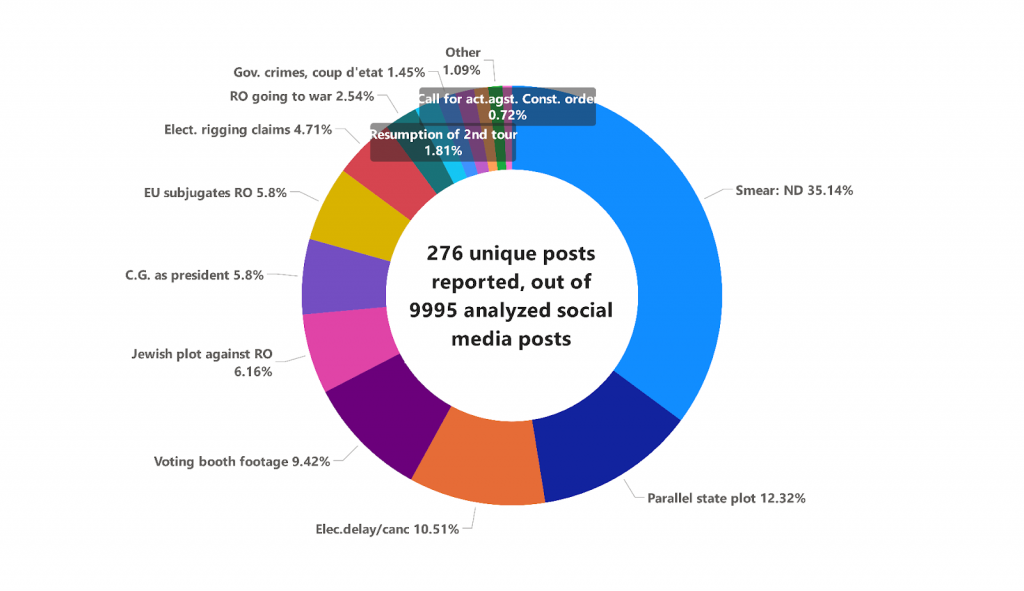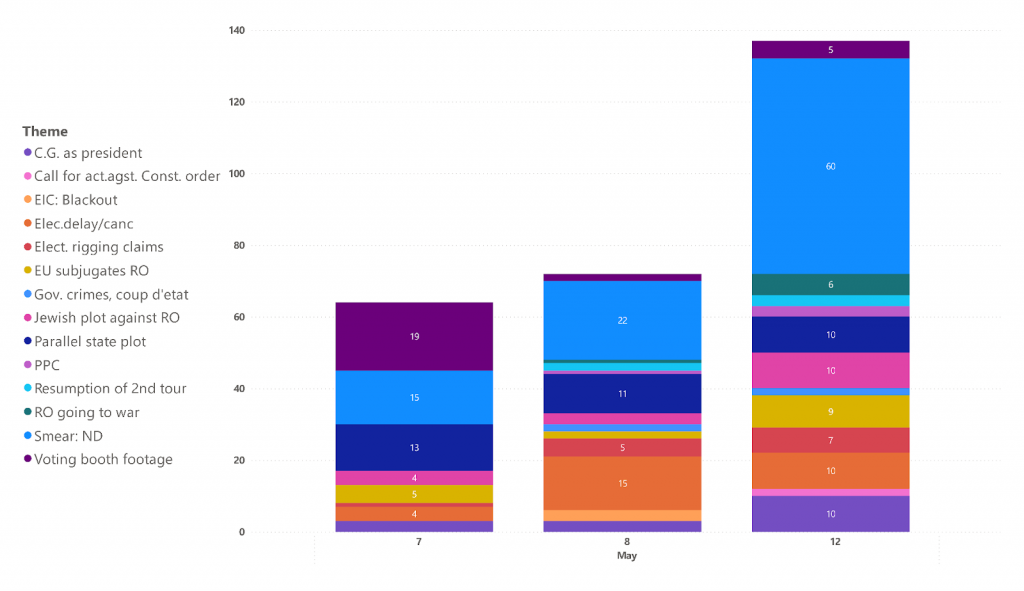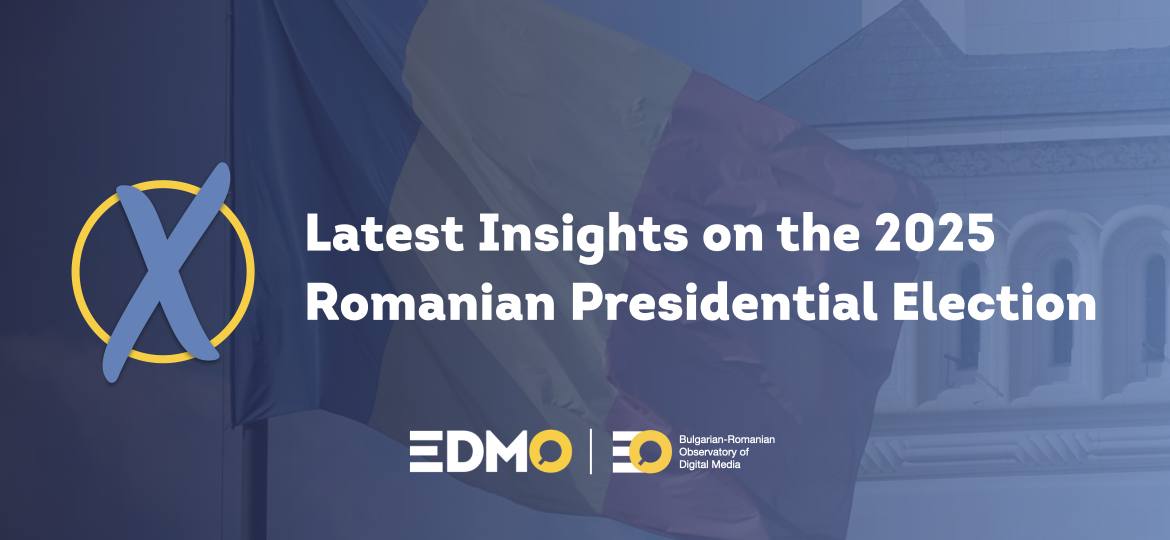Romania’s elections overview – 13 May 2025
EXECUTIVE SUMMARY
With just five days before the May 18 presidential runoff, Romania’s election dynamic remains tense and divided. Current polling shows independent candidate Nicușor Dan and AUR leader George Simion tied at 48.2% each. Their first debate revealed major differences on Ukraine support, economic management, and government appointments, while a planned second debate became controversial when Simion refused to participate and instead released secretly-recorded footage of Digi24 journalists, which Romania’s media authority condemned. The race has attracted major international attention, with seven former US Ambassadors publicly supporting Dan while Marine Le Pen backed Simion. At the same time, false information targeting Romanian institutions and the election process has increased, with experts finding organized storylines promoting conspiracy theories about government control, foreign interference, and election fraud.
WEEKLY OVERVIEW
Digi24 scheduled a presidential debate for Monday at 19:00 between the two candidates. While Nicușor Dan confirmed his participation days in advance, tensions escalated when Simion refused to participate, instead releasing video footage secretly recorded in his Senate office showing his confrontation with five of the network’s journalists. Simion accused them of planning a “media assassination” and practicing “biased journalism,”. Digi24 journalists responded during their broadcast with Dan, stating they were filmed without consent and that Simion misrepresented their intentions. The National Audiovisual Council (CNA) issued a strong reaction, condemning the intimidation of journalists as “gravely contrary to democratic values” and expressing concern about the “manipulated recording of a conversation not intended for public broadcast.”
The two candidates for Romania’s presidency participated in the first debate on Thursday at Euronews. On economic matters, Dan accused his opponent’s destabilizing statements of causing the leu’s depreciation, while Simion denied responsibility, claiming the National Bank of Romania had already forecast this depreciation. Security and support for Ukraine represented one of the most heated moments, with Dan advocating for allocating EU funds to Ukraine in the context of Russian aggression, while Simion declared he would not direct money to Kyiv and even suggested Ukraine should compensate Romania for aid provided so far. Regarding future government leadership, both candidates made nominations: Simion would appoint Călin Georgescu as Prime Minister, while Dan would prefer current interim president Ilie Bolojan. Simion’s housing program, promising €35,000 homes for Romanians, was acknowledged by him as being a marketing plan.
Nicușor Dan announced his commitment to participate in all six televised debates scheduled this week across major networks: Digi24 (Monday), Antena 3 (Tuesday), RTV (Wednesday) and TVR, Antena 1 and ProTV (Friday). Last week, Simion stated he was “available to debate anytime” and would appear “even on openly anti-national television channels.”
George Simion published a blog post attacking his opponents who support Nicușor Dan, accusing them of racism, homophobia, and attacking his family. The post contained what some interpreted as threatening language: “What troubles me now is what we do with you after May 19.” He further claimed to possess evidence of electoral financing fraud and claimed that those hoping to defeat him can only do so through fraud.
On May 9th (Europe Day), Bucharest hosted a major pro-European demonstration. Similar demonstrations were announced for Friday in Timișoara, Brașov, Iași, and Oradea, with reports indicating over 15,000 participants in Victory Square alone. Thousands also gathered in Victory Square for the “Romania in Light” demonstration organized by Nicușor Dan’s campaign on Sunday.
Ilie Bolojan, interim president of Romania, announced his personal support for Nicușor Dan in an interview with Europa Liberă. This comes after Dan mentioned during the Euronews debate that he would like to see Bolojan as Prime Minister if elected president. Bolojan emphasized that while he respects every Romanian’s freedom to vote as they choose, his personal analysis led him to support Dan. “The greatest danger is for us to clash head-to-head and create divisions,” he stated, stressing that the next president’s primary mission should be uniting Romanians to create conditions for development.
The National Bank of Romania reported an exchange rate of 5.0993 lei for one euro on Monday, marking a 0.34% decrease (improvement) from Friday’s rate of 5.1165 lei. This represents the second consecutive day of strengthening for the Romanian currency after last week’s unprecedented depreciation when the euro surpassed the 5 lei threshold for the first time in history on Tuesday. Currency depreciation has practical implications for Romanians, affecting prices for food, services, phone subscriptions, and increasing payments for those with euro-denominated loans or rental contracts.
The popular Romanian online dictionary Dexonline created controversy by conducting a poll asking users about their voting intentions, followed by a message encouraging those not supporting Nicușor Dan to reconsider their position. Users who indicated they wouldn’t vote for Dan received a pop-up message stating: “Oh! Wouldn’t you like to think about it a bit more? Our future and our children’s future are at stake. Let’s choose the open and calculated mind of a mathematician, not the isolation that would leave us outside, at Europe’s door. What do you say?” The message could only be dismissed by clicking a button labeled “OK, you’re right, I’ll think about it more.”
The electoral battle has attracted significant international attention. Marine Le Pen, leader of France’s far-right opposition, announced her support for George Simion on Sunday, referencing the previously annulled presidential election won by Călin Georgescu: “In Romania, the presidential elections were simply canceled, with the blessing of the European Commission.” Conversely, Valérie Hayer, MEP from President Macron’s Renaissance party and leader of the Renew group in the European Parliament, declared her support for Nicușor Dan.
In an unprecedented move, seven former US Ambassadors to Romania (appointed by both Democratic and Republican presidents, including Donald Trump) published a joint letter urging Romanians to consider their vote carefully, warning about the risk of Romania returning to Russia’s sphere of influence. “Today all of this is in danger. Under Putin, Russia is on the offensive again. First, by invading Ukraine. Will Romania be its next target, as it was in Stalin’s time?” the letter questioned, explicitly stating that “only candidate Nicușor Dan defends the interests of the Romanian-American alliance.”
The Bucharest Court of Appeal Prosecutor’s Office provided details about an ongoing investigation into allegations that a 17-year-old girl was sexually assaulted while attending AUR’s summer school in Olimp in September 2023. According to prosecutors, three suspects are being investigated for rape. This case resurfaced in public attention following Simion’s first-round victory and was mentioned during the Euronews debate when Nicușor Dan questioned why the case continues to drag on.
Former candidate Călin Georgescu broke his silence in the first round in a Realitatea Plus broadcast, without explicitly endorsing Simion but using similar rhetoric about “the system” labeling opponents as “extremists and dregs of society.” Georgescu called for solidarity, saying “the truth has always been alive” and urging Romanians to prove they are “strong, united and masters of our own destiny.”
A recent survey conducted by AtlasIntel in collaboration with Politica la Minut between April 25 and May 2, 2025, highlights a fragile democratic climate in Romania ahead of the re-run presidential elections. Although only 28% of respondents are satisfied with how democracy functions in the country, 53% still believe democracy is developing—albeit in an unstable form. Public confidence remains low: just 21% believe the upcoming presidential elections will be completely free and fair, while 48% view the annulment of the December 2024 elections by the Constitutional Court as justified. Corruption is perceived as the most pressing issue by 88.5% of respondents, and more than 70% believe that most politicians are corrupt, with journalists and civil servants also widely distrusted. Despite this institutional skepticism, over 50% of Romanians express strong trust in the European Union and NATO, underscoring these alliances as anchors of stability. The survey sampled 1,773 participants (±2% margin of error).
With just five days before the presidential runoff, an AtlasIntel poll conducted for HotNews shows George Simion and Nicușor Dan tied at 48.2% each. The poll, conducted May 9-12 with 3,995 respondents and a ±2% margin of error, shows most voters from first-round candidates are realigning predictably: 91.7% of Crin Antonescu’s voters and 96.7% of Elena Lasconi’s supporters favor Dan, while Simion gains slight advantages among Victor Ponta voters (22.6%).
SOCIAL MEDIA DISINFORMATION
The dataset comprising the latest reported posts expressly features a convergence of several narratives towards undermining trust in Romanian authorities, de-legitimizing the electoral process, sowing distrust in Romanian institutions and smearing Nicușor Dan’s candidacy.

A recurring theme across all codes is external control or foreign subjugation, such as in “EU subjugates RO” or claims of foreign political interference. These summaries often depict Romania as lacking agency, manipulated by external actors like the EU, France, or global organizations. This overlaps with conspiracy and antisemitic narratives, reinforcing ideas of loss of sovereignty and the existence of hidden agendas driven by occult and illegitimate forces. Another notable trend involves delegitimization of institutions — electoral systems, media, or the judiciary — portrayed as corrupt or complicit in larger plots, consistent across both conspiracy and smear narratives.
In summary, while the specific codes differ in target and tone, the overarching narratives frequently converge on themes of distrust, manipulation, and polarization. Whether promoting a political actor through premature polling claims (PPC), attacking opponents (smear), or invoking broader conspiracies, the summaries tend to simplify complex issues into emotionally charged messages that divide audiences and erode trust in institutions.
Smear: ND (Nicușor Dan) appears most frequently and includes numerous narratives which seek to discredit the candidate. They describe public reactions, alleged crimes perpetrated by the candidate or supposed revelations which depict the candidate as manipulative, dishonest, or incompetent. These narratives commonly include allegations of betrayal, insinuations of vote-buying, or claims of unethical conduct. Across many of the texts, there’s a repeated use of emotionally charged accusations and conspiratorial framing to paint the candidate an enemy of the people and an obstacle to democracy.
Parallel state plot focuses on the idea that a “deep state” or shadow government is manipulating Romania’s political system. Networks of hidden power structures, security services, or judiciary actors that act independently of democratic oversight are referenced as undermining Romanian livelihoods. Common elements include accusations that decisions are made behind closed doors, claims that certain officials are merely puppets, and assertions that legitimate authority is being undermined by unelected forces.
Elec.delay/canc. (Claims of delaying or cancelling the elections) covers claims about delayed or canceled elections, which are often presented as tactics used by those in power to control or sabotage the outcome. These posts frequently mention logistical excuses, blame-shifting, and manipulation of election timelines. The idea of a denial of democratic rights is central, with repeated themes of strategic obstruction, intentional stalling, and last-minute rule changes.
Voting booth footage includes posts which revolve around footage or imagery either alleging electoral fraud or illegally promoting voting preferences.
Jewish plot against RO features antisemitic content that accuses Jewish individuals or groups of orchestrating Romania’s decline or manipulating its politics. Summaries frequently describe shadowy influence, economic control, or foreign loyalty attributed to Jews. Common elements include references to George (or Alex) Soros, globalist agendas, and coordinated plans to undermine national values.
EU subjugates RO is used for content suggesting Romania’s sovereignty and Romanians’ livelihoods are compromised by Romania’s membership in or interactions with the European Union. Narratives typically frame EU involvement as coercive, exploitative, or morally corrupting, describing scenarios where Romanian leaders act under foreign pressure, or national decisions are overridden by Brussels. Recurring phrases highlight loss of independence, external interference, and manipulation by Western powers, presenting the EU and EU actors like France as an imperial force rather than a collaborative institution.
Elect. rigging claims includes narratives which assert Romania’s electoral process was and will be manipulated to produce illegitimate outcomes. The posts consistently featured accusations of stolen votes, tampered ballots, and systematic fraud. Frequently, these stories reference stamp or procedural issues, phantom voters, or evidence being ignored by officials.

C.G. as president centers on narratives promoting Călin Georgescu as a legitimate presidential candidate. Narratives reference stolen elections, portraying him as a victim of political sabotage or the only rational option for the salvation of the Romanian nation. These narratives are using fear and heavy disinformation tactics to undermine trust in institutions and electoral processes on the one hand, and support George Simion as a candidate for presidency on the other.
Resumption of 2nd tour contains narratives demanding and predicting a continuation of the previous second tour between (former) candidates Elena Lasconi and Călin Georgescu which was annulled given foreign interference claims through a Supreme Court injunction. A consistent element is the insistence that a second round is the only fair solution, and that the authorities have decided to legally resume it.
Gov. crimes, coup d’état groups narratives that accuse the Romanian government of committing crimes against its people and staging an unconstitutional takeover by annulling the previous round of elections. These summaries often assert an illegal power grab, intentional destabilization, and manipulation of the justice system and of the press. They include sensational accusations, like “the government orchestrated a silent coup” or “state-sponsored treason,” and repeatedly stress the criminal behavior of public officials, appealing to emotions like betrayal and fear of tyranny.
PPC (Premature polling claims) included posts which aimed to elevate or endorse specific political figures or parties through presenting alleged favorable polls towards a candidate. These narratives often included praise from supposed experts, statements from AI tools or foreign sources, referencing polling data from unofficial sources.
EIC: Blackout (Electoral interference claims) includes claims that the government will interfere with the electoral process. These narratives were present in previous reporting periods and are very specific, alleging a deliberate government (or parallel state) plan to create a nation-wide blackout in order to interfere with the election process, potentially cancelling the elections if the result would not be in “their” favor.
One key characteristic of the false narratives targeting one of the presidential candidates is that it is not only the most frequent within the corpus but the most widely interlinked with the other narratives, like “Parallel state plot”, “Jewish plot against RO”, “EU subjugates RO”, “RO going to war”, “Gov. crimes, coup d’etat”, as well as others. Taking into account previous reporting periods and previous monitoring projects, we can firmly assert that this particular narrative, at this point in time, is grafted onto previous popular narratives acting like audience priming rhetorical devices. Given the particularities of the thematic content reported, as well as the coordinated inauthentic behavior identified within previous reporting periods, some particularly alarming aspects stand out. The persistence and popularity of themes related to:
- The delay, cancelation of the electoral process and election rigging claims;
- A parallel state and occult forces aiming to encroach a dictatorship in Romania;
- Romanians under threat narratives coupled with calls to action.
are creating a highly volatile environment where public disorder and election interference could take place if events referenced in the narratives (i.e. a blackout) would actually occur.
FACT-CHECKING CORNER
Factual monitored the first presidential debate between Nicușor Dan and George Simion, revealing several claims requiring fact-checking. Nicușor Dan made one partially true statement about election timing affecting bond interest rates and one true statement accurately quoting Simion on public sector job reductions. Simion, however, made two falseclaims: denying his housing promises despite video evidence and misrepresenting disability services in Bucharest. Simion made additional false statements, including claiming the EU has no legal existence (despite the Lisbon Treaty granting legal personality in 2009), denying Călin Georgescu’s recorded remarks about Italian PM Meloni, and incorrectly stating AUR parliamentarian Mugur Mihăescu had no Securitate ties.
Other fact-checks addressed misleading social media claims: a partially false allegation that Dan cut disability allowances (only municipal supplements were delayed, not national benefits) and another partially false claim that interim President Bolojan and PM Predoiu held office illegally (their appointments followed constitutional provisions for interim governance).
This newsletter is part of our ongoing work with the Bulgarian-Romanian Observatory of Digital Media, member of EDMO.
This Bulletin is produced and published by Funky Citizens, Member of the Bulgarian-Romanian Observatory of Digital Media (BROD) and the EDMO Fact-Checking Network.
